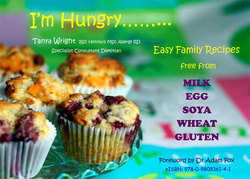Читать книгу I'm Hungry - Tanya Wright - Страница 2
На сайте Литреса книга снята с продажи.
ОглавлениеIntroduction
Thank you for choosing this cookbook, I hope you will be inspired to try out lots of the recipes inside which have been chosen because they are all free from wheat, gluten (rye, barley & oats), soya, egg and milk (dairy). They are also all child-friendly, easy to prepare and foods that the whole family will enjoy. Many are nutritious and some are just very indulgent treats; but then isn’t that how most people eat - treats are after all part of a healthy diet and (just as importantly) a healthy attitude to foods. Banning foods on the grounds of being ‘unhealthy’ only perpetuates the wish to eat them.
A restricted diet can be daunting, but if it is embraced it can be surprising just how easy it can be to prepare and how tasty the recipes are. This keeps the focus on what can be eaten and enjoyed rather than what cannot.
The right diet for children is one that helps them grow and develop, but also one that establishes a foundation for normal behaviour around food and one that is varied, tasty and nutritious. Unfortunately some children who have food allergies do develop abnormal behaviour around food. Some are scared of food because they associate it with an unpleasant experience whilst others associate certain foods with anxiety - (sometimes parental). This is why normalising food, and eating as much variety as possible is the key to successful management.
Issues that some children with food allergies can have due to their mistrust of foods include:
•Poor acceptance and or dislike of certain textures. Dislikes of lumps or more than one texture served at a time
•Dislike of foods touching each other on a plate - if they are served in separate bowls or on compartmentalised plates this is often acceptable
•Refusing to eat with others - some want to eat alone or even in their bedrooms
•Hiding foods that are considered as unacceptable
•Accepting foods only when what is being eaten can be identified. A dish containing mixed foods such as bolognaise or stew is not acceptable to the child
•Refusing foods usually eaten because a disliked food is on the same plate. This ‘contaminates’ the usually liked food and the child will not eat it
The advice for those managing this tricky behaviour is to try and normalise food. Eating together as a family, sitting down at a table, rewarding good behaviour around food, and dealing with each issue at a pace that the child can cope with is the key. It is essential to keep the child feeling they are in control.
The child should never feel criticised and the parent should aim to stay calm. Hurrying the child and creating anxiety will only make the child feel out of control and make the problem worse. Issues should be tackled one at a time.
Tackling this eating behaviour in the right way should be a priority as it can start to affect many other aspects of both the child’s life and the entire family. Also other siblings may pick up on these food related issues and start developing food refusal too. Using food as a bargaining tool can also misfire so is not recommended. Giving the rest of the family the same (or similar) foods, will help the allergic child to feel included at mealtimes. Developing routines for sitting at the table or in the high chair, regular mealtimes and offering smaller portions which are more likely to be finished can all be useful strategies. Special plates, cups, bowls and party plates can also be helpful. Whatever happens, resorting to force feeding is never the answer.
Having an action plan and tick list will help to monitor progress and give direction which can be especially helpful on difficult days when it is easy to forget how much progress has already been made.
Help can be sought from a local paediatric Dietitian if needed. There are also feeding clinics available to help the extreme cases of food phobias and reluctant eating behaviour. A child’s GP can refer to this specialist help if it is required.
Please use and enjoy this book, and learn how easy it really is to make delicious food for the whole family which happens to be free from wheat, gluten, egg, milk & soya.
Tanya Wright
Tanya Wright is a Registered Dietitian specialising in the diagnosis & practical management of food allergy & other food hypersensitivity reactions. She is the author of several books & publications, lectures nationally and is a consultant to the food industry & Allergy Support Associations. She works in NHS clinics in Buckinghamshire & St Thomas’ Hospital London and has a private clinic in Harley Street for infants, children & adults. Tanya is severely allergic to milk & egg herself but loves sharing everyday foods with her family & wants to show others with allergies that they can do the same.
